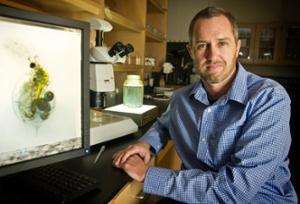First evidence that constant stress causes organisms to program changes in offspring

Researchers have known for decades that the environmental stress experienced by one generation induces changes in behavior, shape, biochemical properties and rates of development of their offspring. But the precise ecological conditions that produced these responses were not known.
Researchers at The University of Texas at Arlington have now provided the first evidence that stable environments like constant predator threats, not unstable conditions, generate these non-genetic "trans-generational responses" in the next generation.
"These results have broad implications for understanding responses to climate change, the spread of invasive species, changes in the availability of food sources or other threats, " said Matthew Walsh, UTA assistant biology professor and leader of the study.
"In times of rapid change, organisms like mammals with a long reproductive cycle would perceive the ecological conditions as unstable and not evolve this "transgenerational response", which may affect their long-term survival," he said. "Organisms that mature in days like water fleas would not perceive any changes and could continue to do so, and perhaps progressively improve their fitness."
Walsh and his team used the interplay of fish and their prey, water fleas, to demonstrate the ecological conditions needed for "trans-generational response." They found that water fleas from populations that experience consistently intense predation responded by programming future generations to develop 10 percent faster to enhance survival rates.
At the same time, parental water fleas that experience variations in predations responded by accelerating their own maturation but did not generate "trans-generational responses" in the next generation.
The findings were published in the Proceedings of the Royal Society B, as "Local adaptation in trans-generational responses to predators." Walsh was accompanied on this study by Stephan Munch of the National Marine Fisheries Service; David Post of Yale University's Ecology and Evolutionary Biology Department; and Todd Castoe, Julian Holmes, Michelle Packer, Kelsey Biles and Melissa Walsh, all from UTA. The research was supported through UTA's Research Enhancement Program.
This new study builds on a previous work in which Walsh demonstrated that one generation can speed up its own maturation in response to a predator threat or speed up the maturation of its offspring, but not do both. That paper, "Predator-induced phenotypic plasticity within-and across-generations: A Challenge for theory?" was also published in the Proceedings of the Royal Society B, and forms part of his ongoing study of how organisms alter the expression of traits across multiple generations.
Morteza Khaledi, dean of the UTA College of Science, commended Walsh on his continued efforts to bridge ecology and evolution.
"This research provides key information on evolutionary response to environmental threats and aligns with the university's Strategic Plan 2020: Bold Solutions Global Impact, under the theme of Global Environmental Impact," Khaledi said. "These responses are widespread across many species, and a better understanding of these mechanisms helps us all."
In 2015, Matthew Walsh received a $220,000 National Science Foundation Long-Term Ecological Research Grant to extend his research to study the aquatic habitats of Alaska and Wisconsin to better document, understand and predict how organisms respond to natural change that is influenced by humans or environmental pollutants.
"This forms part of my long-term goal of building a research program integrating ecological and evolutionary studies," Walsh said. "We need to build awareness of the vulnerability of ecosystems to anthropogenic change."
More information: Matthew R. Walsh et al. Local adaptation in transgenerational responses to predators, Proceedings of the Royal Society B: Biological Sciences (2016). DOI: 10.1098/rspb.2015.2271
Journal information: Proceedings of the Royal Society B
Provided by University of Texas at Arlington



















